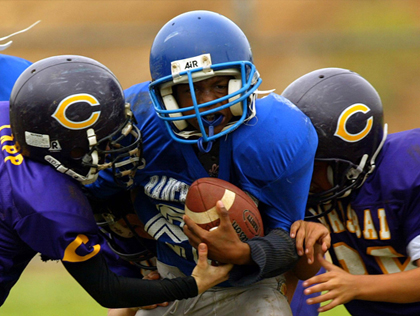HealthWatch: More Red Flags For Youth Football
NEW YORK (CBSNewYork) -- There is more troubling information about the effect of tackle football on young brains.
A new study finds young football players may see damage to their brains even after just one season on the field, CBS2's Dr. Max Gomez reported Tuesday.
Most football studies have focused on the effect of concussions. Other studies have looked at brain issues caused by years of playing football -- from Pee Wee leagues through high school, college and beyond.
FLASHBACK: NY Lawmaker Seeks To Ban Tackling In Youth Football
The new study finds changes in the brain after just one season of youth football.
On almost any fall weekend, at thousands of fields across the country, you can find young boys and a few young girls playing football. And while the sport is immensely popular, it's also becoming increasingly concerning because of gathering evidence of what damage repeated blows to the head might cause, especially to young, developing brains.
Now that evidence has gotten even more concerning.
"As you age your brain starts to create these more efficient pathways, creating more white matter and less gray matter," said Dr. Elizabeth Davenport of University of Texas- Southwestern medical Center.
MORE: HealthWatch: NFL Hall-Of-Famer Taking Part In Study Using Saliva To Help Spot Concussions
That's a medical description that means that young brains develop many, many connections and then prune away the ones that aren't needed for higher cognitive functions.
Davenport and her collaborator, Gowtham Murugesan, recently presented a study at the Radiological Society of North America that shows that even a single season of football is enough to disrupt that normal development.
MORE: Study: Lacrosse Poses Just As Much Risk For Concussions As Football
Co-investigators at Wake Forest Baptist Medical Center collected data from 60 youth football players who had impact sensors in their helmets. They did special MRIs before and after the season and found that the normal pruning away of unused connections was diminished, especially in a critical brain area.
"This area of the brain is responsible for higher order cognitive function," said Dr. Maria Kajankova of Mount Sinai Hospital. "Making decisions, areas like executive functioning."
Just as concerning was that none of the players had a history of concussions or suffered a concussion during the season. Multiple sub-concussive hits were enough, and most did not occur during games.
"Most of the head impacts occurred during the practice," Murugesan said.
FLASHBACK: New Study Sheds More Light On Seriousness Of Concussions In Youth Football
But the researchers were careful not to call these changes damage, or say what they might imply.
"We have no idea what type of long-term effect this might have. Right now, these kids are functioning normally," Davenport said.
Still, brain changes like this are potentially worrying and warrant further investigation, including following these players over the years to see if they develop changes in behavior or thinking.
Again, the surprise is that it didn't take a concussion to cause these brain changes -- just multiple hits over a single season.




